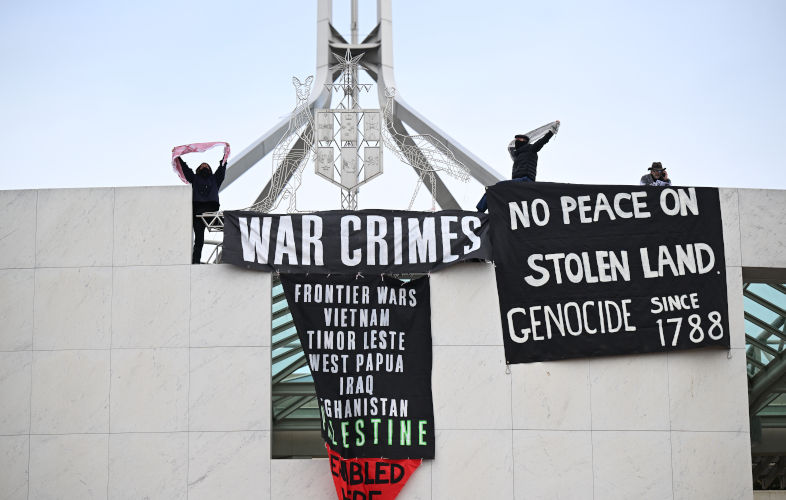Labor’s fall: fast forward to disaster
July 7, 2024
The black and white banners unfurled from the battlements of Parliament House on 4 July made us remember 2003 when ‘No War’ appeared in red paint on the top sail of the Opera House. They lifted the spirits of all who then opposed Australia joining the war in Iraq and all who now want action from Australia to end the war against the Palestinians.
If the pleasure of the parliamentarians’ mid-winter ball the night before was fleeting, most of what followed on the Parliament’s last sitting day was damnable. Several fast-moving events occurred, and there are portentous connections between them.
First: Senator Payman resigned from the Parliamentary Labor Party, saying calmly and with composure that the government’s indifference to events in Gaza meant she could not maintain caucus solidarity. For her, to patiently work for change from the inside, as known deaths in Gaza since 7 October 2023 reach 40 000 and now climb towards 600 in the West Bank, was not endurable. Even though her fellow senator Penny Wong waited out the years it took for Labor to support gay marriage legislation, the comparison is odious: time is not on the side of the Palestinians. Fatima, whose grandfather was a member of the Afghanistan parliament, came with her mother and siblings to Australia in 2003 at eight, to join her father who had done menial jobs since arriving by boat in 1999. They hoped to leave behind autocratic male rule in Afghanistan. Countering that was often cited by the US, Australia, and their allies as one purpose of the war in Afghanistan. As well of course what it started as, finding Osama bin Laden, destroying Al-Qaeda, and waging war on terror.
In a letter to Payman, Labor Friends of Palestine thanked her for speaking out for Palestinian statehood, for a permanent ceasefire, and international humanitarian law. They correctly said Labor’s commitment to recognising the legitimate aspirations of the Palestinian people for self-determination within a sovereign state is set out in the ALP platform. Affirmed at the 2023 national conference, it commits Labor to support ‘the recognition and right of Israel and Palestine to exist as two states within secure and recognised borders’. It calls on the Australian government, as an important priority, to recognise Palestine as a state.
Second: the Payman problem meant that Prime Minister’s winter break began differently from what was planned. Having wisely abstained from the NATO summit in Washington, where his presence would have been marginal, and President Biden might have been unaware of it, he had the opportunity to capitalise on and demolish Peter Dutton’s ill-advised nuclear power pitch. So Mr Albanese might be contemplating early election. In one sign of it, for reasons unexplained except by pressure from the well-organised Jewish lobby, he is reported to be about to appoint as an envoy against Anti-Semitism, a recently retired president of the Executive Council of Australian Jewry, who will be paid by Australian taxes. Several universities, having expelled the students’ pro-Palestine encampments, are now clamping down to ensure no repetition of recent events. It reminds those old enough of the response to the ‘teach-ins’ of the anti-Vietnam war years, but this time, a supposedly multicultural government is supporting one ethnic and religious group of Australians against another.
Third: six years on from a 2018 Parliamentary bipartisan committee report, Contestability and Consensus, and three years in the planning, the new Statutory Committee on Defence suddenly fell over because the Coalition refused any future participation by minor parties – the Greens, that is – in its membership. A Standing Committee on Foreign Affairs Defence and Trade has long served the Parliament. Intelligence and security were the province of a Statutory Committee whose members, presumably to help them in advising government, were shown classified, or more highly classified, material. In 2022 a long-promised inquiry was set up to report on how Australia goes to war, and to deal with civil society challenges about the absence of democracy, transparency, and accountability in these momentous decisions. The result, pre-empted at the outset by Defence Minister Marles and Foreign Minister Wong, was to maintain the status quo, while tweaking the committee power structure in favour of Defence. Why Labor, which had not objected to bipartisan membership of the new defence committee, suddenly stood with the usually marginalised Greens over this, must have much to do with the forthcoming election.
Fourth: elections elsewhere appear headed in contrary directions – France to the right, Britain to the centre-left, the US to mayhem. None of this front of house drama changes the relentless offstage drumbeat of the approaching war against China, to which Australia is committed not only by the nonsensical AUKUS but by the American installations, old and new, now multiplying on our territory. Albanese and Dutton, like their predecessors, understand that resisting the US could mean the end of their governments. No questioning the presence of American nuclear weapons in Australia, or their use from our territory, is permitted. But civil society groups are zooming, spontaneously demanding the action for humanity, justice, and international law that Labor used to stand for.
So the threads come together: public protest to Parliament, internal dissent in the Parliamentary Labor party, falling public support for the Prime Minister, and resistance to war. Why Australia should fight its major trading partner on behalf of an allied ex-democracy inspired by the outdated slogans of white gerontocratic men and Zionist lobbyists is, in fact, the question Fatima Payman poses to us all.

